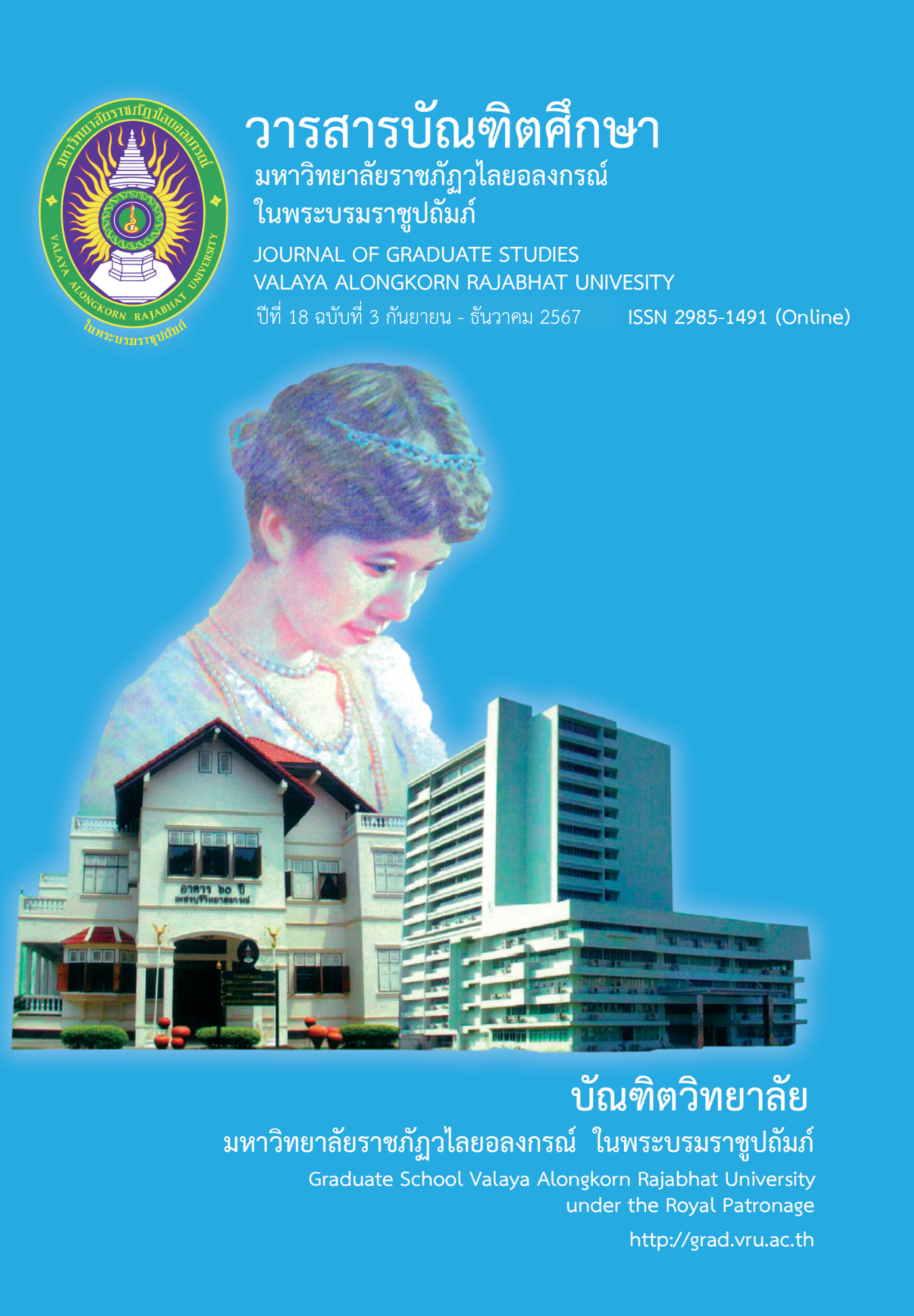CORE COMPETENCIES AFFECTS THE PERFORMANCE OF THE HOTEL INDUSTRY IN THAILAND
Main Article Content
Abstract
The research objective of this research was to study 1) the core competencies and performance of the hotel industry in Thailand, and 2) the effects of the core competencies and performance of the hotel industry in Thailand. The sample for this study consists of more than 242 four-star hotel executives. The research tool was a questionnaire and analyze the data with descriptive statistics and inferential statistics by using a confirmatory factor analysis and the influence of structural equation modeling.
The research results were as follows: 1) training development core competency had the highest mean of 6.09 (SD = 1.122). Next, interactive marketing core competency had the highest mean of 5.97 (SD = 1.742), and specific knowledge of organization core competency had a mean of 5.21 (SD = 1.311). For hotel performance, non-financial performance had the highest mean of 5.95 (SD = 1.907). Next, financial performance equals 5.24 (SD = 1.401). 2) Hotel core competency had a positive influence on hotel performance, hotel core competency had an influence on non-financial performance, and hotel core competency can predict a non-financial performance with 83 percentage (R2 = 0.828), and hotel core competency had an influence on financial performance with a prediction of financial performance of 46 percentage (R2 = 0.467), and hotel core competency had an influence on non-financial performance than financial performance.
Article Details

This work is licensed under a Creative Commons Attribution-NonCommercial-NoDerivatives 4.0 International License.
บทความทุกเรื่องได้รับการตรวจความถูกต้องทางวิชาการโดยผู้ทรงคุณวุฒิ ทรรศนะและข้อคิดเห็นในบทความ Journal of Global of Perspectives in Humanities and Social Sciences (J-GPHSS) มิใช่เป็นทรรศนะและความคิดของผู้จัดทำจึงมิใช่ความรับผิดชอบของบัณฑิตวิทยาลัย มหาวิทยาลัยราชภัฏวไลยอลงกรณ์ ในพระบรมราชูปถัมภ์ กองบรรณาธิการไม่สงวนสิทธิ์การคัดลอก แต่ให้อ้างอิงแหล่งที่มา
References
Agha, S., Alrubaiee, L. & Jamhour, M., (2012). Effect of core competence on competitive advantage and organizational performance. International Journal of Business and Management. 7, 192-204.
Aung, M. (1997). How multinational and national firms compete: a case study of the hospitality industry in Thailand. Doctor of Philosophy, Graduate Program in Administrative Studies, York University.
Aung, M. (2000). The Accor multinational hotel chain in an emerging market: through the lens of the core competency concept. The service industries Journal. 20(3), 43-61.
Barney, J. B. & Clark, D. N. (2007). Resource-based theory: creating and sustaining competitive advantage. United States of Kingdom: Oxford University Press.
Barwise & Farley. (2005). The state of interactive marketing in seven countries: interactive marketing comes of age. Journal of Interactive Marketing. 19(3), 67-80.
Diamantopoulos, A. & Siguaw, J. A. (2000). Introducing LISREL. London: Sage Publications.
Enz, C. A. (2010). Hospitality strategic management: concepts and cases. United States of America: John Wiley & Sons, Inc.
Gronroos, C. (1996). Relationship Marketing Logic. Asia-Australia Journal. 4, 7-18.
Hamel, G. (2007). Future of management. United Stated of America: Harvard Business Review Press.
Hamel, G. and Prahalad, C. K. (1996). Competing for the future. United Stated of America: Harvard Business Review Press.
Han, H(S). (2012). The relationship among corporate culture, strategic orientation, and financial performance. Cornell Hospitality Quarterly. 53(3), 207-219.
Hernandez, E. H. (1997). The association between employment externalization and organizational performance: The moderating roles of strategy and firm-specific knowledge. Doctor of Philosophy in Management, University of California, Irvine.
Hitt, M. A., Ireland, R. D. & Hoskisson, R. E. (2011). Concept strategic management competitiveness & globalization (9th edition). United stated of America: South-Western Cengage Learning.
Jenster, P. & Hussey, D. (2001). Company analysis: determining strategic capability. England: John Wiley & Sons, Inc.
Lovelock, C. H. (1996). Service marketing, upper saddle river, New Jersey: Prentice-Hall.
Lynch, R. (2006). Corporate strategy (4e). Spain: Pearson Education Limited.
National Statistical Office Thailand. (2019). Hotel and guesthouse information. Retrieved from: http://service.nso.go.th/nso/nsopublish/pubs/pubsfiles/Hotel-Guest.pdf?fbclid=IwAR1HsGGweytXW1ba47PnTs9JrTyuwbcN0sFYyZ6lqayUALjZ3_q_NqPzNVc
Porter, M. E. (1996). What is strategy? Harvard Business Review. 74(6), 61–78.
Prahalad, C. K. & Hamel, G. (1990). The Core Competence of the Corporation. Harvard Business Review. 79-91.
Prahalad, C. K. (1993). The role of core competencies in the corporation. Research Technology Management. 36, 40-47.
Schumacker, R. E. & Lomax, R. G. (2004). A beginner's guide to structural equation modeling. Mahwah, NJ: Erlbaum.
Sinjaru, T. (2014). kānwičhai læ kān wikhro̜ thāng sathiti SPSS [Research and Statistical Analysis SPSS]. Weeinterprint: Bangkok.
Tavitiyaman, P., Qu, H. & Zhang, H. Q. (2011). The impact of industry force factors on resource competitive strategies and hotel performance. International Journal of Hospitality Management. 30, 648-657.
Teece, D. J., Pisano, G. & Shuen, A., (1997). Dynamic capabilities and strategic management. Strategic Management Journal. 18, 509-533.
Ubeda, G. M., Claver, C. E., Marco, L. B. & Zaragoza-S., P. (2014). Strategy, training and performance fit. International Journal of Hospitality Management. 42, 100-116.
Wang, Y., Polo, H. & Yang, Y. (2004). The constituents of core competencies and firm performance: evidence from high-technology firms in China. Journal of Engineering and Technology Management. 21, 249–280.
Wernerfelt, B. (1984). A resource-based view of the firm. Strategic. Management Journal. 5, 171-180.
Wu, S. I. & Chen, J. H. (2012). Comparison between hotels and motels using CRM effect model– an empirical study in Taiwan. International Journal of Hospitality Management. 31, 1254–1263.
Wu, S. I. & Lung Lu, C. Z. (2012). The relationship between CRM, RM, and business performance: a study of the hotel industry in Taiwan. International Journal of Hospitality Management. 31, 276–285.
Xiao, Q. (2007). Corporate effects and core competencies: the influence of corporate strategies on the performance of hotel. Doctor of Philosophy, College of Health and Human Development, The Pennsylvania State University.
Yung-Hsiang, C. & Yeh, C.-Y. (2007). Core competencies and sustainable competitive advantage in air-cargo forwarding: evidence from Taiwan. Transportation Journal. 46, 5-21.


